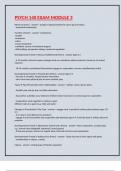PSYCH 140 EXAM MODULE 3
What are peers? - answer-- people of approximately the same age and status
- horizontal relationship
Function of peers - answer--companions
-models
-instructors
-critics
-social comparison
-confidant: source of emotional support
-skill-building: perspective-taking, emotional regulation
Developmental Trends in Infancy/Toddlerhood (Peers) - answer-Ages 0-2
- 6-12 months: interest in peers emerges early on, sometimes object-centered. (some toy of mutual
interest)
- 18-24 months: coordinated interactions (engage in cooperation, assume complimentary roles)
Developmental Trends in Preschoolers (Peers) - answer-Ages 2-5
- increase in complex, reciprocal peer interaction
- also, from more physical play to more symbolic play
Types of Play (Preschooler-peer-relationships) - answer-- Solitary: alone, ignore peers
- Parallel: play side by side, but little interaction
- Associative: activities occur between children (share toys) but no common goal or cooperation
- Cooperative: work together to achieve a goal;
different roles in a game (e.g., hide and seek)
Changes in Preschoolers' Play-Type - answer-- engage most in parallel & solitary play between ages 2 &
2.5
- 2.5-3 years: most likely to be onlookers
- engage in most associative and cooperative play between ages 4-4.5 and the least in solitary play and
onlooker
Developmental Trends in Elementary School Years (Peers) - answer--More cooperative, complex play
e.g., formal rules (dodgeball, hopscotch, board games)
- (true) peer groups, interact on regular basis, informal structure and organization
Developmental Trends in Adolescence (Peers) - answer-- Sharp increase in time spent with peers
- memberships in cliques, crowds
Cliques - answer--small groups of friends; organized
,around self-perceived similarities/interests;
spend lots of time together
Crowds - answer--larger social groups; more based on
reputation and stereotypes, e.g., jocks, nerds
Sociometric Measures (Coie & Dodge, 1988) - answer-1) rate how much you like/dislike classmates
2) nominate those you like the most, like the least, and play or don't play with
(1) Nominations Technique
•Positive nominations ("who do you like most?")
•Negative nominations ("who do you like least?")
Measuring Peer Status (Nomination) - answer-(1) Nominations Technique
•Positive nominations ("who do you like most?")
•Negative nominations ("who do you like least?")
Positive/Negative Peer Nominations:
- few/few: neglected
- few/many: rejected
- many/many: controversial
- many/few: popular
* a fifth category: average: ~1/3 of children
Measuring Peer Status: Rating - answer-(2) Rating-Scale Technique
• Rate every child on a 1-5 "likeability" scale
"How much do you like to play with this person at school?"
Sociometric status and social behaviors - answer--Popular: friendly, cooperative, prosocial, not
aggressive/withdrawn
-Rejected: aggressive, disruptive, bossy, uncooperative, anxious, withdrawn
-Controversial: prosocial, but aggressive and disruptive
-Neglected: shy, not talkative, don't draw attention, has interests other than peers, (reading, arts)
Outcomes of peer rejection - answer-rejected: internalizing (loneliness), externalizing (aggression),
academic difficulties (low grades, dropping out of school)
correlates of peer acceptance - answer-parenting (secure attachment, authoritative parenting) physical
attractiveness, cognitive skills (perspective-taking skills, academic competence, projection of self-
confidence), social skills (being nice, funny, leadership skills [*most correlated with peer
acceptance/rejection*])
, Nature/ Function of friendship - answer-- reciprocal, intimate, positive (different from peers), engage in
more conflict with friends than with nonfriends
- functions: validation, companionship, help/guidance, self-exploration, working out personal problems,
honest feedback, support, security, buffer against unpleasant experiences, teaches cooperation and
negotiation, promotes cognitive skills, enhances performance on creative tasks
Gender differences in friends - answer-- girls desire warmth, closeness, dependency,
- girl friendships more intimate, talk out negative feelings, get more upset when they are betrayed,
Development of friendships - answer-- become more exclusive, begin to focus on having just a few close
friends
- quality improves
- become less stable
Conception of friendships (4-, 5-, 13-year-old) - answer-age 4: "i see [my friends] more" than others.
age 5: "[my friend' plays with me, and is nice to me, lets me play with her dolls"
age 13: "[my friend] helps me, we think alike, like twins" "i can tell her my secrets, and she won't tell
anybody else" "if we fight, we say sorry"
Changes in Friendship/play-type across development - answer-infancy > parallel play
preschool > interactive play
school-age > shared activities
adolescence > intimacy/trust
- Positive and sometimes negative correlates of friendships (esp. in adolescence)
-E.g., binge drinking on college campus
Piaget's Theory of Moral Development - answer-Piaget proposed that as children's thinking becomes
more advanced their understanding of moral problems deepens.
good/bad intentions & big/small consequences
- 2-4 years: pre-moral, no real conception of morality
- 5-7 years: morality of constraint, "heteronomous morality," focus on consequences
- 10+ years: autonomous morality, focus on intentions/motives
How do children learn morality? (Piaget) - answer--Cognitive factors: from one perspective to multiple
perspectives
-Social experiences: parents early on--rules must be followed, & peers later on--rules may be the result
of negotiating, compromising, and respecting other people's points of view
Evaluating Piaget's Theory - answer-THERE IS Empirical Support:
- increased considerations for motives and intentions over development
- Social influences (parents, peers)
- cognitive correlates (perspective taking)
BUT?
Underestimation of young children.




